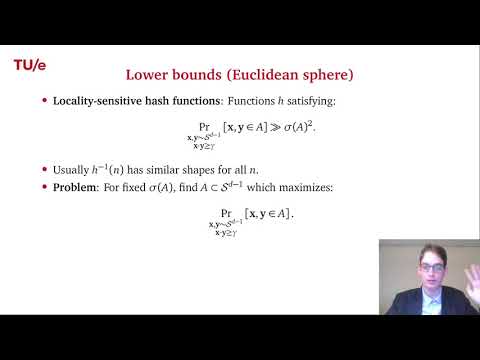Welcome to the resource topic for 2021/785
Title:
Lower bounds on lattice sieving and information set decoding
Authors: Elena Kirshanova, Thijs Laarhoven
Abstract:In two of the main areas of post-quantum cryptography, based on lattices and codes, nearest neighbor techniques have been used to speed up state-of-the-art cryptanalytic algorithms, and to obtain the lowest asymptotic cost estimates to date [May-Ozerov, Eurocrypt’15; Becker-Ducas-Gama-Laarhoven, SODA’16]. These upper bounds are useful for assessing the security of cryptosystems against known attacks, but to guarantee long-term security one would like to have closely matching lower bounds, showing that improvements on the algorithmic side will not drastically reduce the security in the future. As existing lower bounds from the nearest neighbor literature do not apply to the nearest neighbor problems appearing in this context, one might wonder whether further speedups to these cryptanalytic algorithms can still be found by only improving the nearest neighbor subroutines. We derive new lower bounds on the costs of solving the nearest neighbor search problems appearing in these cryptanalytic settings. For the Euclidean metric we show that for random data sets on the sphere, the locality-sensitive filtering approach of [Becker-Ducas-Gama-Laarhoven, SODA 2016] using spherical caps is optimal, and hence within a broad class of lattice sieving algorithms covering almost all approaches to date, their asymptotic time complexity of 2^{0.292d + o(d)} is optimal. Similar conditional optimality results apply to lattice sieving variants, such as the 2^{0.265d + o(d)} complexity for quantum sieving [Laarhoven, PhD thesis 2016] and previously derived complexity estimates for tuple sieving [Herold-Kirshanova-Laarhoven, PKC 2018]. For the Hamming metric we derive new lower bounds for nearest neighbor searching which almost match the best upper bounds from the literature [May-Ozerov, Eurocrypt 2015]. As a consequence we derive conditional lower bounds on decoding attacks, showing that also here one should search for improvements elsewhere to significantly undermine security estimates from the literature.
ePrint: https://eprint.iacr.org/2021/785
Talk: https://www.youtube.com/watch?v=4_acMuQ38X4
Slides: https://iacr.org/submit/files/slides/2021/crypto/crypto2021/201/slides.pdf
See all topics related to this paper.
Feel free to post resources that are related to this paper below.
Example resources include: implementations, explanation materials, talks, slides, links to previous discussions on other websites.
For more information, see the rules for Resource Topics .
